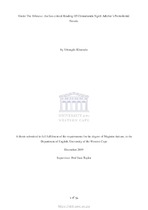| dc.description.abstract | literature, music and culture”. As this statement suggests, ecocriticism is concerned with more than the representation of environmental questions in literature. It provides a way of examining the intersections and interconnections between the natural and human worlds. An ecocritical approach can examine the ways in which these interconnections are produced aesthetically in literature of different kinds, and not just literature that is overtly about the environment. I will argue in this thesis that the novels of one of the rising stars of African and world literature, Chimamanda Ngozi Adichie, are underpinned by an ecological aesthetic in this broad sense, and can, therefore, be read from an ecocritical perspective in the manner implied by Morton. This thesis will show that Adichie’s preoccupation with intersectionalities, interconnections and relationships lend her narratives to an eco-critical inquiry of this kind. | en_US |

